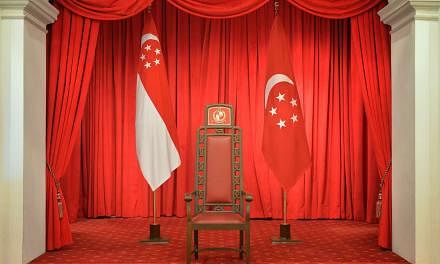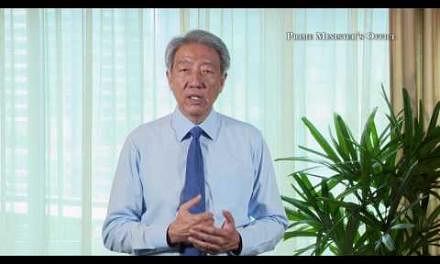SINGAPORE - Changes to the elected presidency and Non-Constituency MP schemes were formally proposed in Parliament on Monday (Oct 10), bringing them one step closer to being effected.
Deputy Prime Minister Teo Chee Hean tabled a Bill to amend the Constitution, and it will be up for debate at the next sitting of Parliament, which is likely to be in November.
The move is part of a larger review of the political system, first raised by Prime Minister Lee Hsien Loong during the debate on the President's Address in January.
The amendments proposed are in five broad areas: the eligibility criteria for presidential candidates, the Council of Presidential Advisers (CPA) and framework of the president's powers, representation of all races in the office of the president, provisions that entrench and safeguard the presidency, and the Non-constituency Member of Parliament (NCMP) scheme.
Most of these changes were covered by the White Paper released in September, which set out the Government's response to recommendations by the Constitutional Commission set up to review the elected presidency.
The key changes include:
Reserved elections
An election will be reserved for a particular racial group if there has not been a president from the group for the five most recent presidential terms. This applies to the Chinese, Malay, and Indian and other minority communities.
A committee will be set up to determine whether an individual satisfies the legal definition of being a member of the Chinese community for the purposes of the election.
This will be similar to the committees that are set up before each general election to determine if candidates belong to the Malays and Indians and other minority communities for the purposes of the Group Representative Constituency scheme.
Meanwhile, any open election will be open to people of all races, including those who do not fall under these major racial categories.
Parliament will decide when the clock starts to determine if the upcoming presidential election due next year needs to be reserved for any particular racial group.
More stringent criteria
A candidate from the private sector must have helmed a company with at least $500 million in shareholder equity to qualify. This is up from the current criteria of having run a company of at least $100 million in paid-up capital.
The shareholder equity threshold will have to be reviewed at least once every 12 years - that is, two presidential terms - by the Presidential Elections Committee (PEC).
The committee can make recommendations for the sum to be raised, but not for it to be lowered. Parliament will then decide if the recommendation should be adopted.
Removal over false statements
Even after being elected, the President can be removed from office if he is found to have made false statements to the PEC, which certifies a candidate's eligibility to run for president.
This includes situations when a candidate has intentionally made a false or misleading statement, or knowingly failed to state a material fact.
More advisers, more consultation
The CPA will be enlarged to include two more members, bringing the total to eight.
The President must also consult the CPA before exercising most of his discretionary powers, such as over fiscal matters.
The Council must state the number of votes for or against its recommendations, and the grounds for these recommendations. Similarly, if the President withholds his assent to supply bills, he must publish his reasons for doing so in the Government gazette.
Parliament can overrule the president if he acts contrary to the recommendation of the CPA and exercises his veto.
Recrafting entrenchment provisions
A set of provisions that "entrench", or protect, the presidency by making it difficult for Parliament to amend the laws governing the office, will be recrafted into a two-tier system.
The first tier covers the establishment of the elected presidency, while the second tier has to do with the President's powers to safeguard the reserves and make key public service appointments.
To introduce changes to the first tier provisions, the Government must either get the president or the CPA's support, or the support of more than half the electorate in a national referendum. To pass the changes, it must be supported by a two-thirds Parliamentary majority.
As for the second tier provisions, the Government must get a three-quarters Parliamentary majority to pass any changes.
The existing provisions had been indefinitely suspended, and the new system of provisions will likewise not be brought into force for now.
More NCMPs
The maximum number of NCMPs will be increased from the current nine to 12, and they will be given the same voting rights as elected MPs.









